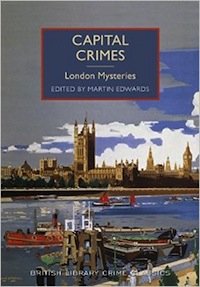The British Library has done crime readers a huge service with its revival of lost or forgotten Golden Age novels in the last few years. With more than a dozen titles now available, their popular crime classics collection is a publishing phenomenon.
The Golden Age charm of the Capital Crimes front cover is maintained throughout this collection of cunning stories set in London from the 1890s to 1940s. As winner of the inaugural Margery Allingham Short Story Competition last year, Martin Edwards is an author and editor with a feel for ingenious, elegant crime stories from a bygone era. He’s also unearthed some highly original tales and early examples of psychological crime.
Arthur Conan Doyle might seem an obvious choice to open an anthology in which characters negotiate the capital’s foggy streets by gaslight, though Sherlock Holmes does not feature. The Case of Lady Sannox is a dread-filled tale involving an arrogant surgeon on an emergency case before his illicit encounter with a society lady. It’s appropriate that the terrifying conclusion takes place in a “mean-looking house in a narrow and sordid street” off Euston Road, not far from where the British Library is today.
Inevitably, some of the earlier tales have become a little stale but Edwards’s expert introductions provide a helpful historical perspective (though, curiously, not the date of publication). A Mystery of the Underground by John Oxenham features a serial killer stalking the District Railway, and the story is effectively told with invented newspaper accounts and a sly wit. This serialised adventure was apparently scary enough to cause passenger numbers to slump in 1897. Edwards sensibly dispenses with the later episodes in a tale that doesn’t maintain its siege-like atmosphere or even its London setting.
Richard Marsh’s The Finchley Puzzle is as far-fetched as you might expect from an author whose horror novel, The Beetle, was published in the same year as Dracula (and was initially more popular). Marsh’s female detective, Judith Lee, is a teacher of the deaf whose ability to lip-read confounds criminals in the capital. So they try to take her out with poisoned chocolates – and it’s not the only use of deadly confectionary in this anthology.
As we move into the 20th century, sensationalism gives way to ingenuity in the plotting and more realism in the prose. Inevitably, though, it’s the early psychological fiction that’s more rewarding than the ‘impossible’ crimes (an ice dagger that melts after the deadly deed is one unlikely weapon).
Edwards does sterling work in rescuing several writers from obscurity, such as Ethel Lina White, whose 1936 novel The Wheel Spins was the basis of Hitchcock’s The Lady Vanishes. Cheese is a love story of sorts in which the cop uses the girl he’s fallen for as bait in a surveillance operation that goes wrong. The humdrum title is inspired by a tiny detail that endangers her life, and White withholds just enough from the narrative to create an almost unbearably tense tale.
Hugh Walpole is another unfashionable author who deserves to be better known for his contribution to crime. The Silver Mask is a chilling account of how a lonely, middle-aged woman allows a bad but “astoundingly beautiful” young man to inveigle himself into her life. The psychological element is also crucial in Thomas Burke’s The Hands of Mr Ottermole, in which the narrator enters the mind of a serial killer stalking east London. It’s a story that builds to a shocking final paragraph, as does EM Delafield’s They Don’t Wear Labels, in which a potential saviour prevaricates when an ailing woman raises the alarm about her charming and popular husband.
It’s not an anthology notable for its star names, though Margery Allingham does feature with a cleverly titled Campion story, The Unseen Door. It’s a mere four pages but this case of revenge in a gentleman’s club demonstrates why Allingham’s one of the greats.
Of course, London is a big part of the appeal of Capital Crimes: the city provides an atmospheric setting for this collection, which covers half a century and introduces us to writers who famously formed the Detection Club, a network of crime authors, in 1930. Their combined efforts were responsible for the Golden Age of British crime fiction, which endures in the pages of this fine anthology.
British Library
Print/Kindle
£5.96
CFL Rating: 4 Stars










